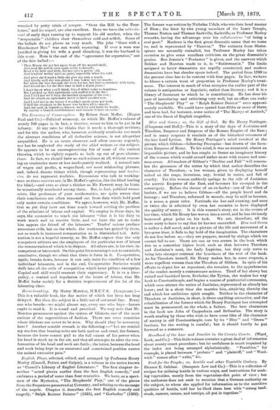The Economy of Consumption. By Robert Scott Moffat. (Kogan Paul
and Co.)—Political economy, on which Mr. Moffat's volume of nearly 700 pages is, in fact, a treatise, seems to him to be yet in its infancy. At any rate, he thinks that it needs a thorough revision; and for this the author, who, however, evidently overlooks too much the abstract conditions of all deductive science, is not altogether unqualified. He is an acute observer, and often reasons cogently, nor has he neglected the study of the chief writers on the subject. He appears to be an uncompromising foe of most of the current theories, which he rightly regards as built up out of pure abstrac- tions. In fact, we should have no such science at all, without reason- ing on tendencies more or less inadequately realised. A natural rate of wages and profits, a wages-fund, are most misleading phrases, and, indeed, denote things which, though representing real tenden- cies, do not represent realities. Economists who talk to working- ' men on these matters are, in Mr. 3foffat's opinion, like the blind leading -the blind,—and even so clear a thinker as Mr. Fawcett may, he hints, be occasionally numbered among them. But, in fact, political econo- mists, like professors of pure mathematics, are quite aware that their conclusions are often reasoned out from data which hold good only under certain conditions. We agree, however, with Mr. Moffat, that as yet they have not done much toward settling the problem of the relations of labour and capital. We employ in these days, he says, the economist to teach the labourer "that it is his duty to work much and to receive little, and we have the art to make him appear the friend of the labourer." Trades' unions produce numerous evils, but on the whole, the workman has gained by them, not so much in increased remuneration as in diminished toil. Arbi- tration is not a hopeful remedy, as Mr. Moffat argues that the only competent arbiters are the employers of the particular sort of labour the remuneration of which is in dispute. All others are, in his view, in- competent or interested. On this point his reasoning is not, to ourminds, conclusive, though we admit that there is force in it. Co-operation, again, breaks down, because it can only raise the condition of a few individual labourers, and in the end, Co-operative Societies would drift into all the evils of competition which beset private enterprise. Capital and skill would reassert their supremaey. It is to a time- policy, a control and regulation of the hours of labour, that Mr. Moffat looks mainly for a decisive improvement of the lot of the labouring class.


































 Previous page
Previous page